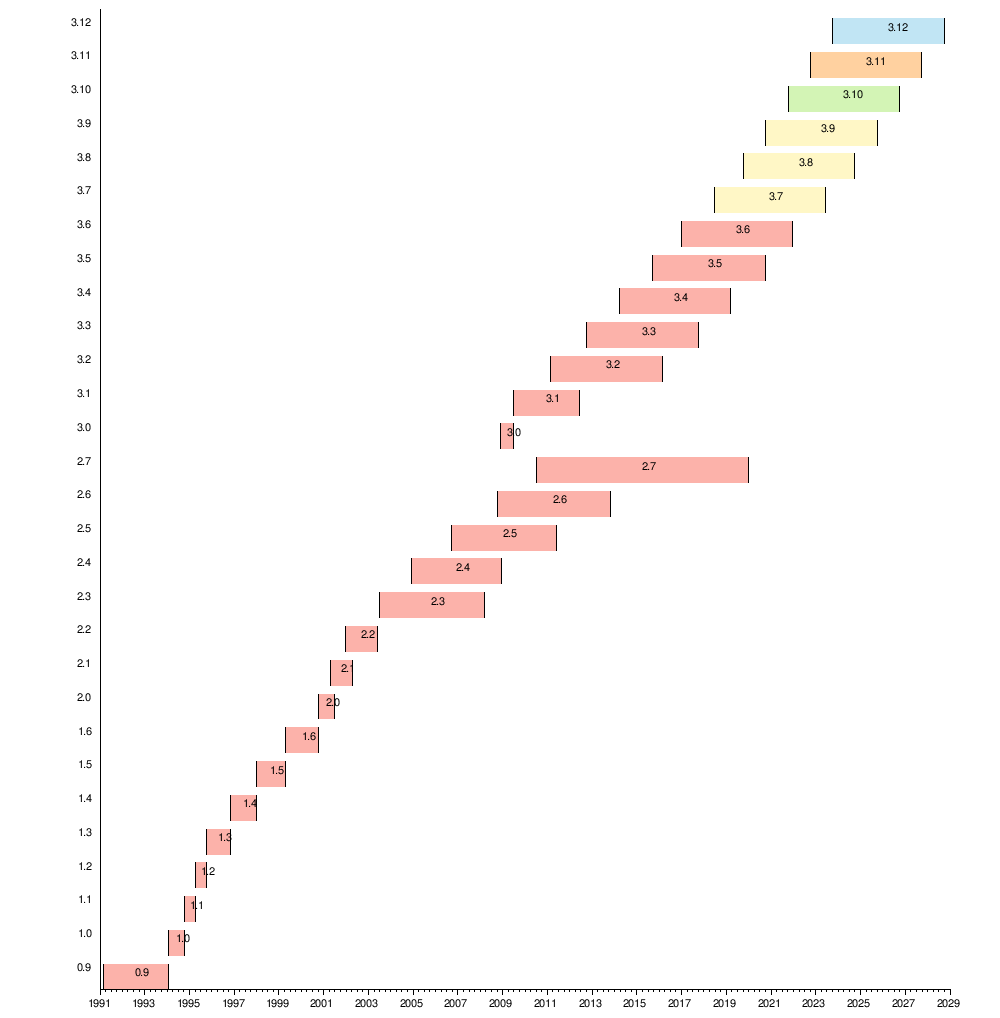Python 1.0.1: a snapshot of history, and how programming languages grow

the goal of the post is not to be exaustive but just list some changes in the grammer of the language, and to do so we need to go back to a really early version of python
This post will be a little more advanced than my normal ones.
But the message I'm makes can be applied broadly.
Prerequisite for this post:
- familiar with python
- know what programming grammers are
- are familiar with how programming langs are designed
python 1.0.1
Lets have a look at the grammer file
Index of /ftp/python/src/

Here is the whole grammer deffintion

this file was created: 1993-12-20
Take note of how short it is its only 62 lines of actual grammer rules
I was supprised to learn that lambda's are actually a really old feature!

nearly.js grammer version of python 1.0.1's grammer file
@builtin "number.ne"
@builtin "whitespace.ne"
@builtin "string.ne"
main -> atom
#single_input -> NEWLINE | simple_stmt | compound_stmt NEWLINE
# file_input -> (NEWLINE | stmt)* ENDMARKER
# eval_input -> testlist NEWLINE* ENDMARKER
#
# funcdef -> 'def' NAME parameters ':' suite
# parameters -> '(' [varargslist] ')'
# varargslist -> (fpdef ',')* '*' NAME | fpdef (',' fpdef)* [',']
# fpdef -> NAME | '(' fplist ')'
# fplist -> fpdef (',' fpdef)* [',']
#
#stmt -> simple_stmt | compound_stmt
#simple_stmt -> small_stmt (';' small_stmt)* ';' NEWLINE
# small_stmt -> expr_stmt | print_stmt | del_stmt | pass_stmt | flow_stmt | import_stmt | global_stmt | access_stmt | exec_stmt
# expr_stmt -> (testlist '=')* testlist
#
# print_stmt -> 'print' (test ',')* [test]
# del_stmt -> 'del' exprlist
# pass_stmt -> 'pass'
# flow_stmt -> break_stmt | continue_stmt | return_stmt | raise_stmt
# break_stmt -> 'break'
# continue_stmt -> 'continue'
# return_stmt -> 'return' [testlist]
# raise_stmt -> 'raise' test [',' test]
# import_stmt -> 'import' NAME (',' NAME)* | 'from' NAME 'import' ('*' | NAME (',' NAME)*)
# global_stmt -> 'global' NAME (',' NAME)*
# access_stmt -> 'access' ('*' | NAME (',' NAME)*) ':' accesstype (',' accesstype)*
# accesstype -> NAME+
#
# exec_stmt -> 'exec' expr ['in' test [',' test]]
#
#compound_stmt -> if_stmt | while_stmt | for_stmt | try_stmt | funcdef | classdef
#if_stmt -> 'if' test ':' suite ('elif' test ':' suite)* ['else' ':' suite]
# while_stmt -> 'while' test ':' suite ['else' ':' suite]
# for_stmt -> 'for' exprlist 'in' testlist ':' suite ['else' ':' suite]
# try_stmt -> 'try' ':' suite (except_clause ':' suite)+ | 'try' ':' suite 'finally' ':' suite
#
# except_clause -> 'except' [test [',' test]]
#suite -> simple_stmt | NEWLINE INDENT stmt+ DEDENT
#
##test -> and_test ('or' and_test)* | lambdef
#and_test -> not_test ('and' not_test)*
#not_test -> 'not' not_test | comparison
#comparison -> expr (comp_op expr)*
#comp_op -> '<'|'>'|'=='|'>='|'<='|'<>'|'!='|'in'|'not' _ 'in'|'is'|'is' 'not'
#expr -> xor_expr ('|' xor_expr)*
#xor_expr -> and_expr ('^' and_expr)*
#and_expr -> shift_expr ('&' shift_expr)*
#shift_expr -> arith_expr (('<<'|'>>') arith_expr)*
#arith_expr -> term (('+'|'-') term)*
#term -> factor (('*'|'/'|'%') factor)*
#factor -> ('+'|'-'|'~') factor | atom trailer*
#atom -> '(' [testlist] ')' | '[' [testlist] ']' | '{' [dictmaker] '}' | '`' testlist '`' | NAME | NUMBER | STRING
atom -> NAME# | NUMBER | STRING
#lambdef -> 'lambda' [varargslist] ':' test
#trailer -> '(' [testlist] ')' | '[' subscript ']' | '.' NAME
#subscript -> test | [test] ':' [test]
#exprlist -> expr (',' expr)* [',']
#testlist -> test (',' test)* [',']
#dictmaker -> test ':' test (',' test ':' test)* [',']
#
# classdef -> 'class' NAME ['(' testlist ')'] ':' suite
#DEDENT ->
NEWLINE -> [\n]
NUMBER -> %decimal
STRING -> %dqstring
NAME -> [a-zA-z]:+Index of /ftp/python/src/
A Brief Timeline of Python
The development of Python occurred at a time when many other dynamic (and open-source) programming languages such as Tcl, Perl, and (much la...


Author
by oran collins
github.com/wisehackermonkey




